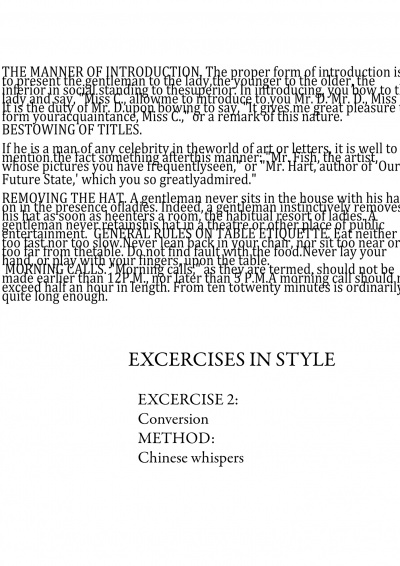User:Darija Medic/project2: Difference between revisions
Darija Medic (talk | contribs) No edit summary |
Darija Medic (talk | contribs) No edit summary |
||
| Line 1: | Line 1: | ||
[[File:Cover_ex.jpg|400px]] | [[File:Cover_ex.jpg|400px]] | ||
| Line 11: | Line 10: | ||
and rise of translation applications, that can be further carried via Chinese | and rise of translation applications, that can be further carried via Chinese | ||
whispers more through a rhizomatic structure than a linear one. The concept is deliberately realized in a book to illustrate the gradualness of this process. The gradualness can also be seen through the transparency of the paper, all the small changes from one translation to the other are visible on the English version of the text, that is repeated on every page in the current state of interpretation. The text chosen to reinterpret is taken from an old English book of conduct, alluding to the book as a codex, set of rules, institution, and the performativity of rules through interpretation, also alluding to the hybridisation of the English language around the world. | whispers more through a rhizomatic structure than a linear one. The concept is deliberately realized in a book to illustrate the gradualness of this process. The gradualness can also be seen through the transparency of the paper, all the small changes from one translation to the other are visible on the English version of the text, that is repeated on every page in the current state of interpretation. The text chosen to reinterpret is taken from an old English book of conduct, alluding to the book as a codex, set of rules, institution, and the performativity of rules through interpretation, also alluding to the hybridisation of the English language around the world. | ||
Other retranslation experiments | |||
[[Media:2nd thematic project.pdf | More text]] | [[Media:2nd thematic project.pdf | More text]] | ||
Revision as of 12:07, 5 March 2011
This homage to Raymond Queneau deals with the topic of production, translation and reinterpretation, through retranslating the same text over and over again, until the meaning severely changes, using the already much accepted authority of the service Google translate. Every translation shows which version is translated from and to which language, so the loosing of meaning is conveyed in just a few easy steps.
The mistranslations that occur through the process of retranslation are inevitable in a hyperbolic, erasable but constant production of content. They are the literal representation of a communication gap, noise that arises through the constant exchange of content (words, information, knowledge) and rise of translation applications, that can be further carried via Chinese whispers more through a rhizomatic structure than a linear one. The concept is deliberately realized in a book to illustrate the gradualness of this process. The gradualness can also be seen through the transparency of the paper, all the small changes from one translation to the other are visible on the English version of the text, that is repeated on every page in the current state of interpretation. The text chosen to reinterpret is taken from an old English book of conduct, alluding to the book as a codex, set of rules, institution, and the performativity of rules through interpretation, also alluding to the hybridisation of the English language around the world.
Other retranslation experiments

